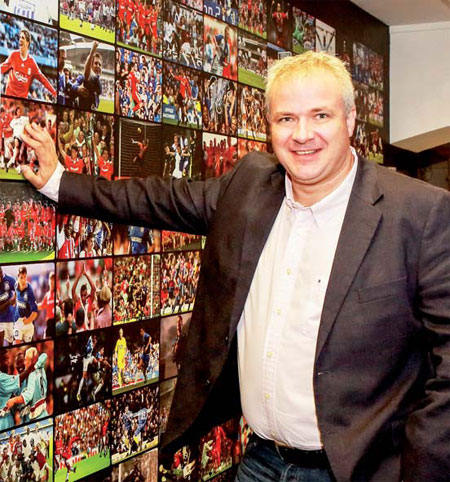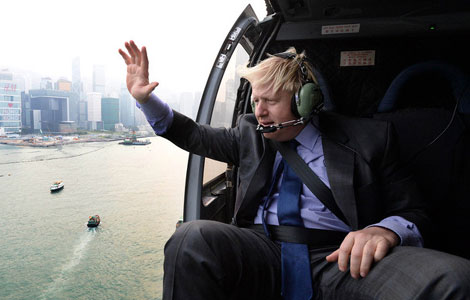Kitted out for premier markets
Updated: 2013-10-18 08:56
By Qiu Bo and Sun Xiaochen (China Daily Europe)
|
|||||||||||
|
Scott Taunton, chief executive of Talksport radio station, says more money will go into the Premier League as more brands want to be associated with football. Xie Songxin / China Daily |
Menswear firm enters the big league in international brand promotion
Chinese companies are turning to the world's most popular sports tournament, English football's Premier League, in an effort to score highly in their home and away markets.
Partnerships are also being coveted by the top English sides as a way of attracting greater support in China.
Earlier this year, league title holders Manchester United agreed three-year deals with China Construction Bank and China's soft drinks leader Wahaha. They allow CCB exclusive rights to produce a club-branded credit card, and Wahaha to become the club's first official soft drinks partner in China, Xinhua News Agency reported.
More recently, at the start of the 2013-14 season, Chinese men's clothing retailer Bosideng signed a two-year deal with London club Tottenham Hotspur to become the team and management's official formal menswear partner, providing suits, shirts, ties and accessories. The brand will also work with Spurs to build up the club's name and presence in China.
"Bosideng London has already established a reputation for style and innovation, values which we share here at the club," Daniel Levy, Tottenham Hotspur's chairman, announced.
The deal follows the opening last year of Bosideng's first flagship store in the exclusive Mayfair district of central London.
"The English Premier League is the world's leading football brand and it has an outstanding business reputation in UK," says Wayne Zhu, CEO of Bosideng UK.
"The agreement is aimed at making the brand well-known and increasing its visibility worldwide, especially in the European market."
Any Chinese brand with overseas ambitions should consider the Premier League as a springboard for building an international image, he says.
Bosideng also looked at two of the capital's other top football clubs, Arsenal and Chelsea, but chose the North London-based Spurs due to their positive response.
"We didn't approach any club outside London, since we expect players and fans to have a chance to visit our store," Zhu says.
The official partnership will increase Bosideng's brand's exposure through club media conferences, its stadium and website, and give the clothing company access to Spurs' supporter database.
Zhu says in conducting the deal he realized the Premier League itself is still in the process of international expansion, which in addition to the Asian market, involves new broadcast deals in North America and Latin America.
"It offers a much better promotion platform for Chinese enterprises," he says. "But only for the ones with concrete plans in overseas markets."
Meanwhile, the Chinese market remains one of Premier League main targets, Zhu adds, and Chinese partners can help with football clubs' marketing development and perhaps advise them on smarter plans.
"I believe we will see more of such win-win situations, triggered by the expansion needs of Chinese brands."
Last year, research by sport business consultancy Sport+Market showed the Premier League was the most watched league in the world, with 70 percent of 2.08 billion football fans following the action.
"There's no doubt Chinese enterprises will reap great benefit from this kind of alliance (with Premier League clubs)," says Lu Yang, deputy editor of Sina, a major Chinese news website.
"However, the big clubs all maintain stable alliances with international brands, which makes it difficult for Chinese companies seeking opportunities.
"Medium-sized or small clubs would be a more realistic aim, but since those clubs' influence only spreads to fans from Europe or the UK, such a strategy is only effective for companies that target European markets."
Since the Premier League was formed in 1992, it has steadily been catching the attention and cash of China, though the first cooperation with Chinese companies was not until 2002, when mobile phone dealer Kejian took over as the shirt sponsor for the Liverpool club Everton, largely in support of two Chinese players.
"I think the English Premier League is the most popular product," says Scott Taunton, chief executive of the radio station.
"It surprises some people, the amount of money that surrounds Premier League football, but there doesn't seem to be any slowing down in that process.
"There is more and more money going into the game, and brands want to be associated with that product, whether it is shared sponsorship or whether it is in being part of televising the matches."
Contact the writers through qiubo@chinadaily.com.cn
(China Daily European Weekly 10/18/2013 page15)
Today's Top News
Scientists requested government to plant GM crops
Travelers to Europe bypass attractions of Brussels
Li urges greater effort on reforms
'Constructive ideas' on thorny issues needed
US deal key to nabbing fugitives
JPMorgan, DOJ reaches $13b deal
As China's economy grows, so does reform call
Expanded property tax trials predicted
Hot Topics
Lunar probe , China growth forecasts, Emission rules get tougher, China seen through 'colored lens', International board,
Editor's Picks

|

|

|

|

|

|






